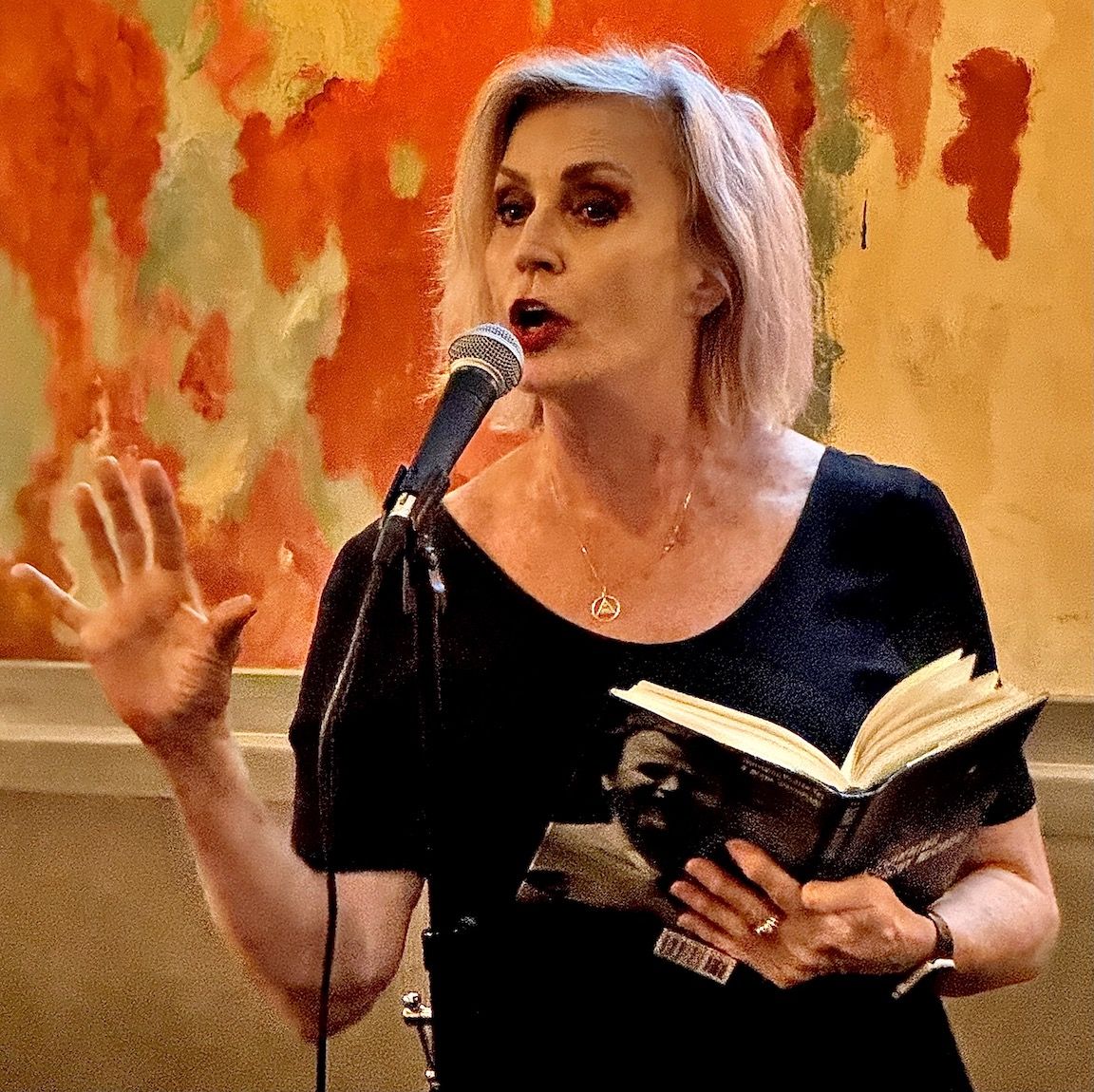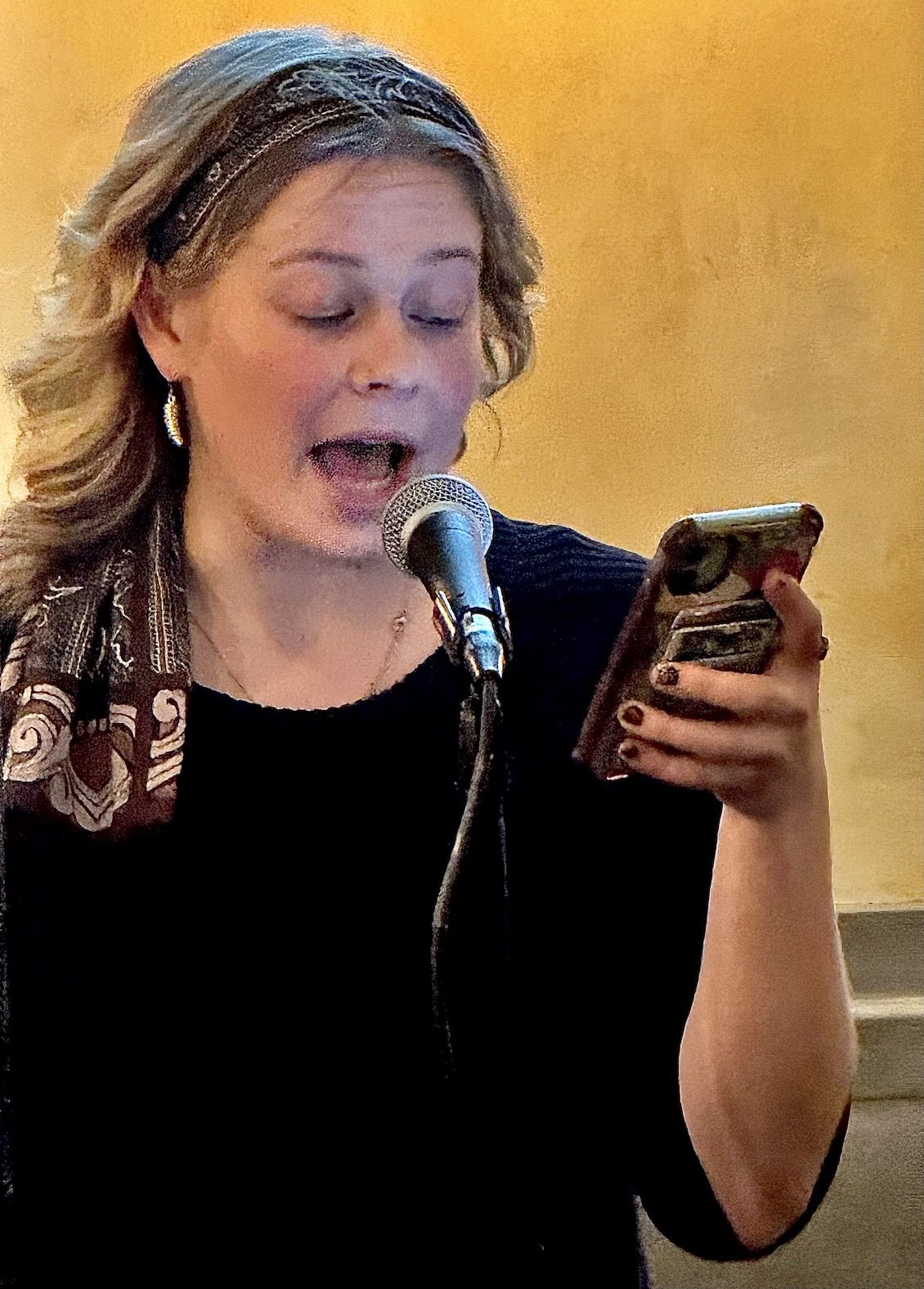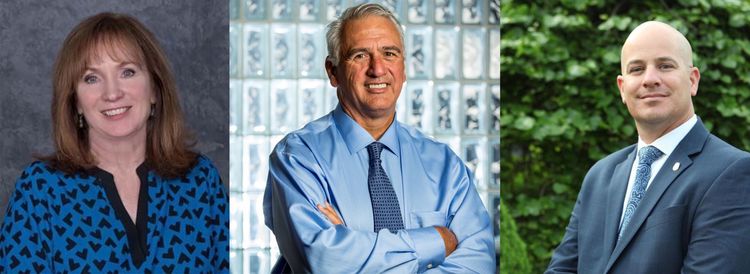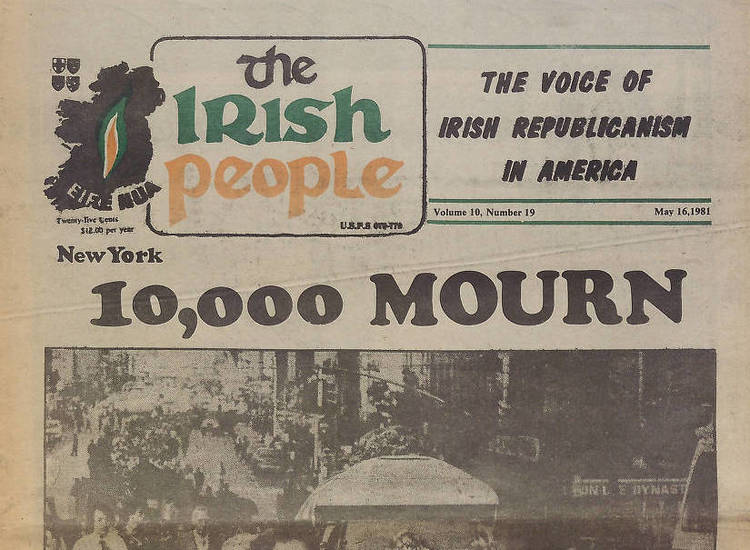Tuesday’s IAWA salon began with a big hurt. Malachy McCourt, IAWA co-founder, raconteur, author, and singer of all things Irish, had passed away the day before. And so, IAWA president Brendan Costello began the evening with the observation that when someone dies, a moment of silence is usually observed. Then he paused, smiled, then continued with the observation that silence was not apropos in Malachy’s case. The room signaled their agreement with loud applause and much laughter to the memory of their best-loved member. Then Al Gonzales, celebrating the long life and longer memory of Malachy, began to bagpipe his way up to the front of the room. But, suddenly, the sound of silence fell over the room. Anthony hurriedly left, came back, and piped his way to the front of the room, before exclaiming: “that’s never happened to me in the 20 years I’ve been playing! Malachy’s here!!”
The first presenter was poet, playwright, fiction author and screen writer John Kearns. John read an excerpt from his novel in progress, which uses the myth of Orpheus as a framework. Roy, the Orpheus character, is under anesthesia and dreams that he is lost in a labyrinth beneath the Spectrum in Philadelphia. Based on Theseus and the Minotaur, Roy dreams that it is taking place at a haunted house called Brigantine Castle and the Minotaur is the Jersey Devil (a kind of urban legend like Bigfoot). The work’s mythological tone edged us again and again into Borges’ magic realism, with now and then changing place at will. John’s “Boann and the Well of Wisdom” will be performed at the Greek Cultural Center in Astoria as part of the 1st Irish Theatre Festival on April 26, 27 and 28.
Next was Kiley Karlak Malloy, a poet, translator, and essayist, who will be graduating from Barnard College in May before leaving for Dublin to pursue a master's degree in literary translation at Trinity College Dublin. Kiley read two poems: “Love Letter to the 1 Train” and “Revelations Summer in Morningside Heights” Revelations began: “Summer is always about my self: my veins. Then, midway thru: “I pick up leaves and learn something good about myself.” Before ending with: “This/ summer/ I’m bleeding, we’re all bleeding, all dying. Dying/ ongoing,/ dying —ing, living the survival that exists in a / gerund. / Because we’re not gone yet.” The room was still, went stiller, then burst into applause for her poems and her upcoming sojourn within the walls of Trinity.
She was followed by Marlene May, an Irish writer from New Jersey, whose work has been published on www.irishcentral.com, in The Connaught Tribune and The Inquisitive Eater. She is currently enrolled in an MFA program at the New School, where she is writing her debut novel with the working title, “Fortune, Farm and Family.” The extract Marlene read was a love story slowly unfolding between Deirdre and Sean, who meet one night in a pub in Dublin on the banks of the Liffey. To the background music and the taste of a well-poured Guinness, Sean is telling Deidre that their time together will be short because he was leaving for America in a month. But then, that date keeps changing.
The next presenter was Mary Goggin, a New York-based actor who has appeared in numerous stage productions, television series, films and commercials. However, Mary said she considers her most important accomplishment the writing and performing of her award-winning solo show,“Runaway Princess,” which she describes a “hopeful tale of heroin, hooking and happiness”. Her play has been performed in the Edinburgh Festival (2022) and will be in Dublin in September 2024 (www.runawayprincessplay.com). Holding aloft Malachi’s “A Monk Swimming,” Mary said, “this one’s for you, Malachy”, saying how thankful she will always be for the non-wavering support Malachy gave her when she was going through very difficult times. Tonight she said she would turn her memory of Malachy into the first act of “Runaway Princess.”

Mary Goggin.
Logan Reyes, poet, actor and singer, presented next. Logan is currently pursuing a degree in English literature at Iona University, with the goal of teaching at his alma mater, Archbishop Molloy High School. Logan said it was his first time reading in a public forum, and that he was a bit nervous. But there was no acolyte’s nervousness in evidence as he read “Gen Z,” “The Fruits of War” or Aimless.” Rather, there was proof of a young poet’s penetrating analysis of today’s, and humanity’s, pervading malaise over where and how tomorrow will arrive. Thus, the last lines of the poem “Aimless”: “We come to resent our pleasant lives / As our spirits are corrupted in drives. /In the universe, we forget our place,/A tribe of lost souls: the human race.”
Maureen Brady followed. Author of four novels, a collection of short stories and three books of nonfiction, Maureen teaches creative writing at NYU and The Peripatetic Writing Workshop. Tonight, she read from her novel “Tessa's Landing” (currently in search of a publisher). Tessa’s Landing is the story of a 16-year-old girl who in 1846 is put on a Famine ship for marriage to a man she has never met; but that man fails to show up. According to family lore, this happened to Maureen’s great-grandmother and served as the inspiration for her novel. Tessa’s story had everyone spellbound: what would be the next adventure for an abandoned but feisty young Irish girl?
John Oakes, publisher of “The Evergreen Review,” co-founder of OR Books, and editor and publisher at several independent presses, presented next. He read from the chapter, “The River of Kings: Fasting as Protest,” from his first book, "THE FAST: The History, Science, Philosophy, and Promise of Doing Without. John noted that the Irish history of fasting in protest long predates the arrival of Christianity. Fasting, known as a “troscead” or “cealachan,” once had its own codified set of rules, and it was applied against a person in power, and involved a public shaming. According to the “Great Book of Irish Law” that was composed in the 5th century CE from oral traditions, fasting was so highly regarded that “fasting illegally” merited a fine. And for St. Patrick, fasting – and in particular fasting as a tool for change – was integral to his understanding of the faith of pre-Christian Ireland.
At half time and again at closing, everyone was treated to an hilarious burst of cello, guitar and song performed by New York City based Erin Hall on cello and her husband Gabe on guitar. Both musicians raised the roof beams high with their musical performance and Erin’s well-worded vocals: first of “Towels!,” then later with “Call the doctor!” Erin’s latest album, “Great Blue” (self-released 2019), defies easy categorization, jumping from Latin, funk, jazz and blues, to French pop.
And then, Tuesday began to flicker. But not the evening. That ended on a boisterous high C, a note everyone knew Malachy would have loved. And on and on, the high C reached out, reached up. And on and on, hearts star-bright and overflowing raised their voices to Malachy’s holy and forever “sing the song, children!”
And so, we sang.









